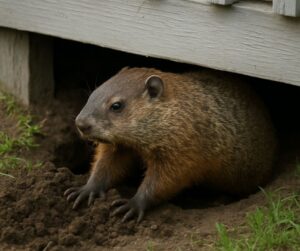WESTCHESTER COUNTY #
WESTCHESTER COUNTY #
Are you noticing soft, weak ground in your yard, a torn-up garden, large mounds of dirt, and holes underneath your deck or porch? You might have a groundhog problem. Groundhogs are a common nuisance wildlife in the Westchester, NY area during the spring and summer. It’s important to deal with a groundhog problem as soon as possible, as their destructive burrowing and feeding habits can quickly decimate your lawn and garden. This blog can help you recognize the early signs of a groundhog problem, as well as what steps to take so you can act fast and protect your lawn.
Groundhogs love your yard because it provides them with plenty of sources of food and shelter. Groundhogs are primarily herbivores, feeding on grass, garden vegetables, fruit, flowers, and ornamental plants, however groundhogs may also eat bird eggs and insects. Either way, whether it’s from a lush vegetable garden, a bird’s nest, or some insects passing through, your yard has what groundhogs are looking for.
Your yard also provides the perfect place for groundhogs to dig out their extensive burrows. Groundhogs nest in aerated soil to create temperature regulated homes that offer protection from predators like foxes and coyotes. Groundhogs usually prefer soil that’s loose and not too rocky for their burrows, and many landscaped yards can provide them with exactly that. Digging underneath solid structures like your deck or porch provides them with more cover and protection against predators, and they can also absorb more heat from your home’s foundation this way.
 Some of the common signs that you have a groundhog problem in your yard in Westchester include:
Some of the common signs that you have a groundhog problem in your yard in Westchester include:
Groundhogs don’t go away on their own, and if you have a groundhog problem left unchecked, it can lead to serious consequences. Groundhogs can cause structural damage to your foundation, which can lead to it cracking and settling, which can lead to other issues like water damage and termites. If groundhogs are digging underneath your deck, it can cause the deck to slowly sink into the earth. Groundhog tunnels can also lead to cave-ins, which are a serious safety hazard. If you’re walking over a groundhog tunnel when it caves in, you can trip and may hurt yourself.
If you have a flourishing vegetable garden, groundhogs can destroy your crop yields year after year if they are not dealt with. It can make all your hard work feel like it’s going to waste when a groundhog is able to steal your tomatoes or carrots before you get a chance to try them. The same goes for flower gardens, or any other ornamental plants.
 There are plenty of Do-It-Yourself deterrents for groundhogs on the market in Westchester, but some of them might not work as well as you want them to. Devices that use light, reflection, noise, or vibration might scare groundhogs off initially, but they will just come back once they realize there is no real danger. The same applies for scent-based repellents like castor oil.
There are plenty of Do-It-Yourself deterrents for groundhogs on the market in Westchester, but some of them might not work as well as you want them to. Devices that use light, reflection, noise, or vibration might scare groundhogs off initially, but they will just come back once they realize there is no real danger. The same applies for scent-based repellents like castor oil.
Unfortunately, DIY groundhog trapping also might fail, as groundhogs are very clever, and can evade traps set by a newcomer. Novice trappers can even make it harder for professional trappers, as they might be inadvertently training groundhogs to avoid common trapping methods. Don’t worry, if DIY groundhog removal/deterrent methods fail you, Westchester Wildlife is here to help.
If you have a groundhog nesting on your property in Westchester, your best bet is to call a professional nuisance wildlife removal service like Westchester Wildlife. Animal control will only deal with animals that are on public areas like roads or parks, or animals that pose a direct safety threat like a rabid raccoon. For animals causing a nuisance like a groundhog burrowing under your porch, call Westchester Wildlife.
If you are noticing groundhogs tearing your garden up and destroying your lawn in Westchester, contact the professionals at Westchester Wildlife for humane, effective groundhog trapping and removal services. Our technicians have years of experience dealing with groundhogs, so you can rest assured that we can catch these clever little critters. After the groundhogs are gone, we can provide you with wildlife fencing around the perimeter of your yard, around your foundation, or underneath your deck or porch, buried a few feet deep to keep groundhogs from digging underneath it. Contact our crew to get started today with a FREE estimate at (800) 273-6673!
Toll Free: 800.273.6673
Phone: (914) 760-5713
PO Box 579 Brewster,
NY 10509 USA
* Westchester Wildlife, LLC is not affiliated with the County. All services are fee based.
Copyright © 2025 Westchester Wildlife LLC. All Rights Reserved.